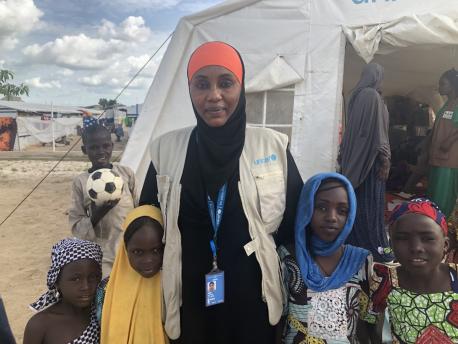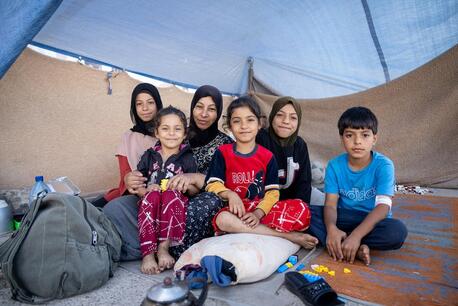
Celebrating Women Humanitarians on the Front Lines for UNICEF
Every day, brave and dedicated humanitarian aid workers give their all to make the world a better place. Here, women working in Nigeria and the Central African Republic share their stories.
UNICEF and partners are working tirelessly all over the world to save and protect children.
On World Humanitarian Day, UNICEF celebrates dedicated women who are giving their all to make the world a better place. Each year, UNICEF's humanitarian programs provide millions of children with a range of lifesaving services. None of these would be possible without the support of women humanitarians. Let's honor these women who work tirelessly to improve countless lives, showcasing incredible strength along the way.
Miatta Abdullai Clark, OIC, Child Protection in Emergencies, Maiduguri, Borno State, Nigeria
"My own difficult childhood led me to become a humanitarian worker specializing in child protection. My mission is for no child to ever have to go through what I did.
"Seeing children regain their confidence and hope after going through trauma is incredibly fulfilling. For the past 18 years, I have had many highs and lows, and made countless sacrifices.
My own difficult childhood led me to become a humanitarian worker specializing in child protection. My mission is for no child to ever have to go through what I did.
"Despite a close brush with Ebola while working in Liberia, much of my work as a humanitarian has been memorable. One of the best days of my life was in Bangladesh in 2017. We labored all day, using canoes and walking on muddy and slippery paths to provide safe drinking water for thousands of Rohingya refugees. We didn't think much about a break because the need for safe water was overwhelming.
"In humanitarian work, we need to keep focused and be strong for our team, family and the people we serve. Seeing a child, like a 12-year-old I met on one of my field visits, being released from captivity, receiving psychosocial support and overcoming her trauma is what motivates me to keep going."

Miatta Abdullai Clark, far right, is a child protection worker in Maiduguri, Borno State, Nigeria. © UNICEF
Aisha Kolo Lawan, Child Protection Specialist in Maiduguri, Borno State, Nigeria
"I became a humanitarian worker by accident in 2014 when the crisis in northeast Nigeria reached its peak and thousands were displaced. Children got separated from their families and loved ones. Some lost either a single parent or both, and they needed support. That moment changed my life. In the eyes of those we support, an act of kindness goes a long way.
"Each encounter with vulnerable communities is memorable, but my best memories are when I see a smile. A smile confirms that a child is feeling secure. I see a lot of smiles at UNICEF-supported Child-Friendly Spaces where children can play and participate in recreational activities.
A smile confirms that a child is feeling secure. I see a lot of smiles at UNICEF-supported Child-Friendly Spaces where children can play and participate in recreational activities.
"As humanitarians, we work to reach everyone in need. I embark on road trips with armed security to be able to reach people in need in areas that are risky and dangerous. Last month, six aid workers were abducted and are still being held. We must overcome these challenges in order to protect and reunify children who have been separated from their parents or caregivers.
"Despite challenges, I keep going because I know women and children are more comfortable receiving support from female humanitarian workers who speak the local language and know the culture. Every day, I challenge gender inequality, discriminatory social norms and prevailing power imbalances in the humanitarian field. I believe all women have the courage and strength to take responsibility for building a better future for women and children in northeast Nigeria.
Marie Jeannette Keinefei, UNICEF Security Guard, Central African Republic
"Six years ago, I did not have the money to continue my university studies, so I sold cakes and coffee to support my family. But the income was not sufficient, so I trained to become a security guard — a profession with few women in my country.
Despite being one of only two women on my team, we still train equal to our male colleagues, and I feel incredibly valued.
"For the past two and a half years, I have been working at the UNICEF compound. Despite being one of only two women on my team, we still train equal to our male colleagues, and I feel incredibly valued. However, I often face mockery or criticism from other women because they do not understand that I can do a job they believe is only reserved for men.
"This job has allowed me to support my three children so they can go to school and ensure they are well-fed and healthy. I am motivated to keep going because I have gained more respect in my family and [from] those around me, and I now dream of continuing my studies in computer science."

Hina Derabe Maobe is a UNICEF water, sanitation and hygiene specialist in the Bossangoa Field Office in the Central African Republic. © UNICEF
Hina Derabe Maobe, WASH Specialist, Bossangoa Field Office, Central African Republic
"I became a humanitarian worker because I believe that there is still hope for the Central African Republic. People will always need clean drinking water and adequate sanitation to survive.
"Despite enjoying learning about new cultures and languages, humanitarian work often means you endure the stress of living far from your children and a difficult social life. Women are still the first victims of humanitarian crises and are the most marginalized in the recovery process. As a female humanitarian, I can work to change this.
I became a humanitarian worker because I believe that there is still hope for the Central African Republic.
"Women and girls still spend a lot of their time collecting water, so as a woman I have the opportunity to access many beneficiaries who otherwise would be unreached. I am thankful that in my office, female humanitarians are not treated differently than males. But in the field, we see disparities. Hygiene conditions are still more difficult for women than men, and more men than women still work in the WASH [water, sanitation and hygiene] sector. We need to encourage more women to be involved in WASH."

Dr. Mauricette Deballe cares for mothers and children at the UNICEF Bossangoa Field Office in the Central African Republic. © UNICEF
Dr. Mauricette Deballe, Bossangoa Field Office, Central African Republic
"I became a humanitarian worker to no longer be a spectator at all the difficult situations women and children face in my country. I know many of their experiences firsthand, having lived through them myself. Today, I work to provide access to lifesaving health services to people in the Central African Republic.
As a humanitarian, every day is a battle for the greater good and every little victory counts.
"As a humanitarian, every day is a battle for the greater good and every little victory counts. It's difficult living apart from my family, but I draw strength from those I serve and continue to work to be competitive in the health field.
"My most memorable experiences are the times I have been able to get vaccinations to the hardest-to-reach children — despite road closures or security situations. And I have lived through all the vaccination campaigns I have supported since 2008. I believe that health care should be accessible to all, and I aim to reduce inequalities and lower maternal and infant mortality and morbidity rates through my work."
Top photo: Aisha Kolo Lawan is a UNICEF child protection specialist in Maiduguri, Borno State, Nigeria. © UNICEF
HOW TO HELP
There are many ways to make a difference
War, famine, poverty, natural disasters — threats to the world's children keep coming. But UNICEF won't stop working to keep children healthy and safe.
UNICEF works in over 190 countries and territories — more places than any other children's organization. UNICEF has the world's largest humanitarian warehouse and, when disaster strikes, can get supplies almost anywhere within 72 hours. Constantly innovating, always advocating for a better world for children, UNICEF works to ensure that every child can grow up healthy, educated, protected and respected.
Would you like to help give all children the opportunity to reach their full potential? There are many ways to get involved.




